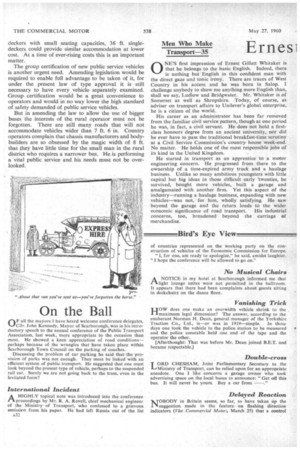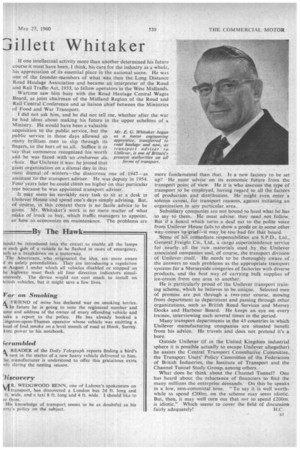Ernes]
Page 34

Page 35

If you've noticed an error in this article please click here to report it so we can fix it.
3illett Whitaker
0 NE'S first impression of Ernest Gillett Whitaker is that he belongs to the basic English. Indeed, there is nothing but English in this confident man with the direct gaze and tonic irony. There are traces of West Country in his accent and he was born in Salop. I challenge anybody to show me anything more English than, shall we say, Ludlow and Bridgwater. Mr. Whitaker is of Somerset as well as Shropshire. Today, of course, as adviser on transport affairs to Unilever's global enterprise,
he is a citizen of the world. .
His career as an administrator has been far removed from the familiar civil service pattern, though at one period he was, in fact, a civil servant. He does not hold a firstclass honours degree from an ancient university, nor did he ever have to pass the traditional breakfast-time scrutiny at a Civil Service Commission's country house week-end. No matter. He holds one of the most responsible jobs of its kind in the United Kingdom.
He started in transport as an apprentice to a motor engineering concern. He progressed from there to the ownership of a time-expired army truck and a haulage business. Unlike so many ambitious youngsters with little capital but big ideas in those difficult early 'twenties, he survived, bought more vehicles, built a garage and amalgamated with another firm. Yet this aspect of the industry—running a haulage business, expanding with new vehicles—was not, for him, wholly satisfying. He saw beyond the garage and the return loads to the wider economic significance of road transport. His industrial concerns, too, broadened beyond the carriage of merchandise,
If one intellectual activity more than another determined his future course it must have been, I think, his care for the industry as a whole, his appreciation of its essential place in the national scene. He was one of the founder-members of what was then the Long Distance Road Haulage Association and became an interpreter of the Road and Rail Traffic Act, 1933, to fellow operators in the West Midlands.
Wartime saw him busy with the Road Haulage Central Wages Board, as joint chairman of the Midland Region of the Road and Rail Central Conference and as liaison chief between the Ministries of Food and War Transport.
I did not ask him, and he did not tell me, whether after the war he had ideas about making his future in the upper echelons of a Ministry. He would have been a valuable acquisition to the public service, but the public service in those days allowed so many brilliant men to slip through its fingers, to the hurt of us all. Suffice it to
say" that -commerce recognized his worth and he was faced with 'an .ernbarras du. choix. But Unilever it Was: he joined that
• giant organization on a dismal day in that most dismal of winters-the disastrous one of 1947—as assiStant to the transport adviser: He was deputy in 1954. Four years later he could climb no higher on that particular tree because he was appointed transport adviser.
It may seem an enviably easy task to sit at a desk in Unilever House and spend one's days simply advising. But of coUrse, in this context there is no facile advice to be given. Mr. Whitaker's work is no mere matter of what make of truck to buy, which traffic managers to appoint, or how to. economize on maintenance. The problems are more fundamental than that. Is a new factory to be set up? He . must . advise on its economic 'future from the transport point of view. He it is who assesses the type of transport to be empldyed, having ,regard to all the factors of production and distribution. He' might even enter a solemn caveat, .for transport reasons, against initiating an organization in ajty particular area Subsidiary companies are not bound to heed what he.has to say to them. He must advise: they need . not follow. But if a board which turns a deaf ear to the polite voice from Unilever House fails to show a -profit or in some other way comes to grief—it may be too bad -for that board.
Some of his immediate responsibilities are S.P.D., Ltd., General Freight Co., Ltd., a' cargo 'superintendence service for ...nearlyall the raw, materials used by the Unilever assoCiated companies and, of course, the transport division of Unilever itself. He needs to be thoroughly aware of the answers to such problems as the appropriate transport systems for a Merseyside congeries of factories with diverse products, and the best way of carrying bulk supplies of ice-cream from one area to another.
He is particularly proud of the Unilever transport training scheme, which he believes to be unique. Selected men of promise are put through a two-year course, mouing from department to department and passing through other organizations, such as British Road Services and Mersey Docks and Harbour Board. He keeps an eye on every trainee, interviewing each several times in the period.
Many transport departments in the 43 countries in which Unilever manufacturing companies are situated benefit from his advice. He travels and does not pretend it's a bore.
Outside Unilever (if in the United. Kingdom industrial sphere it is possible actually to escape Unilever altogether) he assists the Central Transport Consultative CoMmittee, the Transport Users' Policy Committee of the Federation of British Industries, the Institute of Transport and theChannel Tunnel Study Group, among others.
What does he think about the Channel Tunnel? One has heard about the reluctance. of financiers to find the many millions the enterprise demands. On this he speaks in a low, non-committal tone. "To say it is well worthwhile to spend £200m. on the scheme may seem idiotic. But, then, it may well turn out that not to spend £200m. is idiotic." Which seems to cover the field of discussion
fairly adequately! H.C.
















































































































